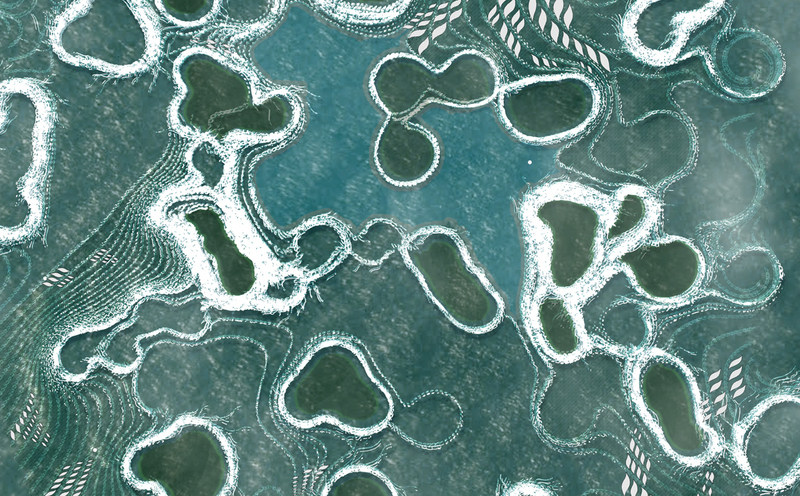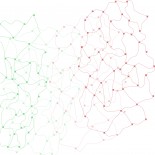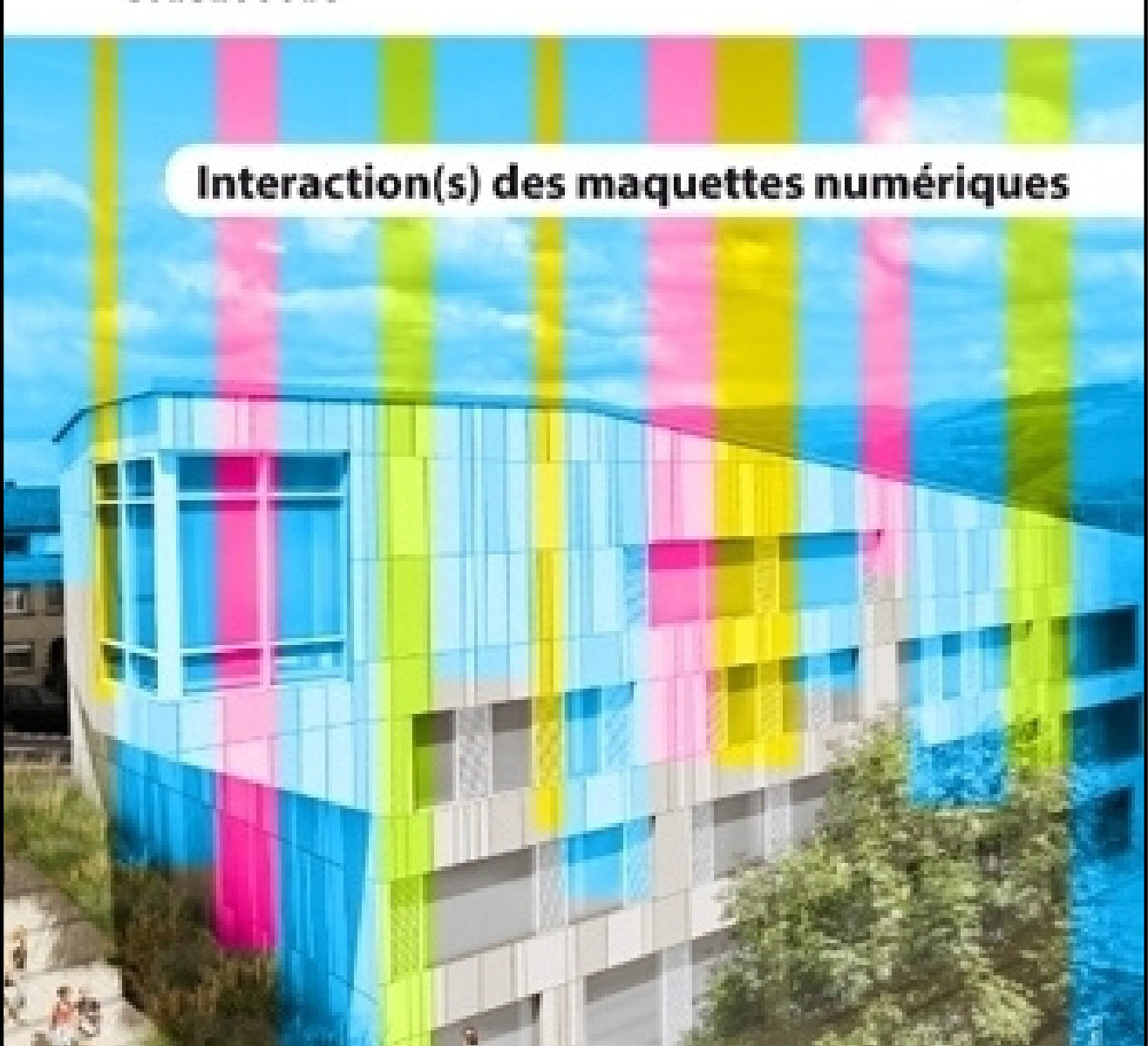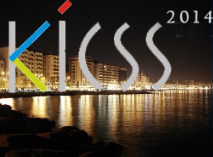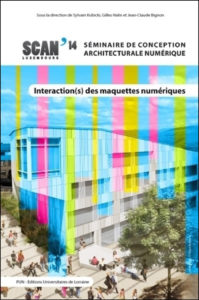
Interaction(s) des maquettes numériques
Actes du 6ème Séminaire de Conception Architecturale Numérique
Édité par Jean-Claude Bignon, Gilles Halin et Sylvain Kubicki
PUN – 2014
Résumé :
Dans le domaine de l’Architecture, l’Ingénierie et la Construction, les pratiques de conception, de construction, et d’utilisation des bâtiments s’appuient désormais couramment sur des modèles numériques du bâti. Ces modèles sont amenés à devenir progressivement les garants d’une qualité du projet, de l’efficacité de la communication entre les intervenants ou encore de la maîtrise des coûts de construction et d’exploitation des infrastructures. Ce constat s’étend naturellement aux pratiques de conception à l’échelle urbaine, aux grandes infrastructures, aux projets liés au patrimoine historique ou encore aux démarches de gestion et d’entretien de bâtiments et parcs immobiliers.
BIM (Building Information Modeling) et SIG (Système d’Information Géographique), acronymes largement répandus dans les communautés professionnelles, scientifiques et pédagogiques, désignent cette modélisation partagée de l’architecture, l’infrastructure, du territoire ou du patrimoine. Ces approches associent également des processus collectifs qui sont nécessairement liés à la production ou à l’utilisation des modèles.
Constatant que « BIM » est devenu un mot-clé largement répandu dans le monde professionnel, les chercheurs et pédagogues peuvent désormais transformer leur action au plus près des attentes du terrain. C’est l’angle de lecture proposé pour cet ouvrage, regroupant 27 contributions sélectionnées après expertise par un comité scientifique. Celles-ci ont été présentées lors de la conférence internationale SCAN’14 (Séminaire de Conception Architecturale Numérique) qui s’est tenue au Centre de Recherche Public Henri Tudor, du 18 au 20 juin 2014.
Sommaire
Préface
Démarches de projet et maquette numérique
Rob van Helvoort, Valérie Becquart – Data driven design
Aurélie de Boissieu, David Thomas – Évaluer et développer une pratique BIM dans l’ingénierie du bâtiment
Philippe Marin, José Antonio Cuba Segura – Outils, méthodes et acteurs : analyse des limites à l’utilisation de la maquette numérique
Conrad Boton, Sylvain Kubicki – Maturité des pratiques BIM
Modèles collaboratifs et maquette numérique
Daniel Zignale, Sylvain Kubicki – Modélisation des échanges d’information orientés objets du bâtiment
Aida Siala, Mohamed Bouattour, Bilel Grissa – Modélisation de la notion d’espace dans le contexte de la coopération numérique
Vincent Delfosse, Christelle Boulanger, Aurélie Jeunejean, Cyril Carré, Roland Billen, Pierre Leclercq – SPATIODATA, un modèle de bâtiment non-constructif, collaboratif et multi-usage
Tarcisio Mendes de Farias, Ana Roxin, Thomas Durif, Florian Orpelière, Christophe Nicolle – Enrichissement sémantique d’un fichier IFC pour une extraction partielle dynamique.
Programmation architecturale et stratégies de conception
Annie Guerriero, Clémentine Fry – La programmation architecturale au Luxembourg : Enquête et perspectives
Amirabbas Najari, Marc Barth, Michel Sonntag – Contribution de la notion de Contradiction à la Stratégie Conceptuelle pour la phase amont de la Conception Architecturale
Cyril Mauger, Sylvain Kubicki – Intégration de la notion de Service dans un processus de modélisation adapté à la programmation architecturale
Conception et construction numérique
Louis Destombes – Modélisation et imaginaire constructif
Thierry Ciblac – Stratégie de modélisation paramétrique d’une maquette physique évolutive
Frédéric Delvaux, Romuald Bianchi, Sylvie Jancart – De la matière à l’espace : une voie d’intégration numérique et matérielle
Julien Meyer, Gilles Duchanois, Jean-Claude Bignon – Le pli, une figure d’interface entre architecture et ingénierie
Echelles et modélisation urbaine
Bernard Ferriès, Marion Bonhomme – La maquette numérique, un moyen d’augmenter la densité informationnelle d’un territoire ?
Charles-Edouard Tolmer, Christophe Castaing, Denis Morand, Youssef Diab – Structuration des informations pour les projets d’infrastructures : Proposition de niveaux complémentaires aux Level Of Detail et Level Of Development
Nancy Ottaviano, Alain Renk – Outils publics de visualisations
Conception et dispositifs urbains
Khaoula Raboudi, Abdelkader Ben Saci – Génération de volumes de contrôle solaire
Myriam Servières, Daniel Siret, Laurent Lescop – Outils numériques mobiles, ambiances et design urbain : quelques résultats issus du workshop pluridisciplinaire MOBIANCE
Mohamed Adel Souami, Sabrina Kacher – La modélisation numérique 3D comme outil d’aide à la compréhension du dispositif urbain de l’immeuble passage : cas de la ville d’Alger
Approches pédagogiques numériques
Abdelkader Boutemadja, Carine Driesmans, Sylvie Jancart – Le B.I.M. et la maquette virtuelle comme moyen pédagogique permettant le rapprochement entre les cours d’informatique et l’enseignement du projet d’architecture
Serge Faraut, Bernard Ferries, Jean-Pierre Goulette, Sandra Marques – Architectures numériques au service du projet : de l’analyse urbaine au projet architectural
Philippe Marin, Marian Janda, Yann Blanchi – Les principes de la SmartCity support d’une activité projectuelle et d’une contextualisation subjective
Conception architecturale et Systèmes d’Information
Amira Bejaoui, Najla Allani-Bouhoula – Expérimentation architecturologique de l’esquisse architecturale
Houssem Eddine Mnejja, Temy Tidafi – Moyens numériques et conception architecturale : une approche pour gérer les connaissances
Rached Barbouche – Modélisation et connaissance des formes décoratives dans l’architecture de Tunis de la fin du XIXe et du début du XXe siècle
Comités
Index des auteurs
Détails
Presses universitaires de Nancy
Date de première publication : 15 juillet 2014
Livre broché
334 p.
ISBN-10 : 2814301713
ISBN-13 : 9782814301719
Le Comptoir des presses d’universités


